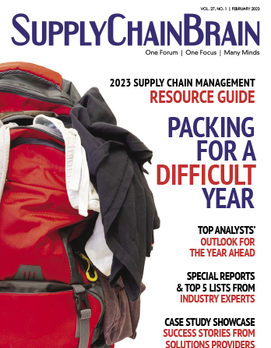
Home » SanDisk Tames Inventories Through FreeFlow
SanDisk Tames Inventories Through FreeFlow

July 1, 2007
Flash memory chip producer SanDisk has supply chain challenges few other businesses face. Its supply chain is extremely long because of the global manufacturing complexity of the tiny semiconductors. The product lifecycle of the individual SKUs is increasingly short, while the prices for each gigabyte of memory drops about 45 percent within a year.
"The difficult supply chain issues that every high-tech business faces are greatly amplified in the flash memory industry," says SanDisk's senior operations director Bill Paganini, who set up his company's retail supply chain five years ago. "We have greatly improved our forecasting, S&OP processes and collaborative links with retailer customers, but excess product is often just a fact of life in this business."
To deal with the inevitable mismatches of supply and demand, Paganini brought in FreeFlow, an inventory asset management company that provides both supply chain expertise and online auction technology.
"FreeFlow helped us establish a process matrix that links inventory policy to the product lifecycle," says Paganini. "Our management team has taken ownership of a cascading inventory disposition strategy to deal with every situation we are likely to face."
The first course of action for SanDisk's retail group is always to sell to plan and to its first-tier retail channels. But if there is an excess of a particular product as defined by the company's inventory policy, that product would be available to the company's sales force for market to alternate channels such as introductory packages to prospective customers or special promotions with existing customers. If there is still an excess, FreeFlow hosts a private online auction for the disposition of the at-risk inventory. FreeFlow has created a web site and trading platform specifically for SanDisk at www.SanDiskExcess.com.
Before the auction, FreeFlow and SanDisk define the target price ranges and exactly who will be allowed to participate in the auction. The memory chip market includes thousands of brokers and distributors but with FreeFlow, SanDisk is able to target just those potential buyers that the chip maker is comfortable with.
Once the auction parameters are agreed upon, FreeFlow takes over. It manages and vets the potential bidders. It handles all credit, collection and settlement at the close of the auction, which typically lasts one to two weeks. FreeFlow's fee comes out of the sale revenue. If for any reason the reserve price is not met, SanDisk can cancel the sale.
"When the auction is completed, we ship the goods just like any order," says Paganini. "If there are any after-sale questions or issues, FreeFlow is usually able to handle them."
According to Paganini, the results of working with FreeFlow are impressive. SanDisk has been able to achieve:
• Recovery improvement on sale of disposed inventory two times greater than with previous methods
• No IT involvement required because of FreeFlow's hosted software
• Inventory disposition cycle time reduced from 30 days to five days
• Reduction in administrative overhead by 75 percent
• Full online audit trail of all transactions, which has passed the company's Sarbanes-Oxley audit
• Global coverage that handles asset disposition in the U.S., Europe and Asia
"FreeFlow has brought us their best practices developed with Apple, Dell and other top-tier technology companies," says Paganini. "Our management team now has insights that have proven invaluable in setting our inventory strategy as well as in conducting an excellent asset disposition process."
RELATED CONTENT
RELATED VIDEOS
Subscribe to our Daily Newsletter!
Timely, incisive articles delivered directly to your inbox.
Popular Stories

2023 Supply Chain Management Resource Guide: Packing for a Difficult Year
VIEW THE LATEST ISSUECase Studies
-
JLL Finds Perfect Warehouse Location, Leading to $15M Grant for Startup
-
Robots Speed Fulfillment to Help Apparel Company Scale for Growth
-
New Revenue for Cloud-Based TMS that Embeds Orderful’s Modern EDI Platform
-
Convenience Store Client Maximizes Profit and Improves Customer Service
-
A Digitally Native Footwear Brand Finds Rapid Fulfillment



